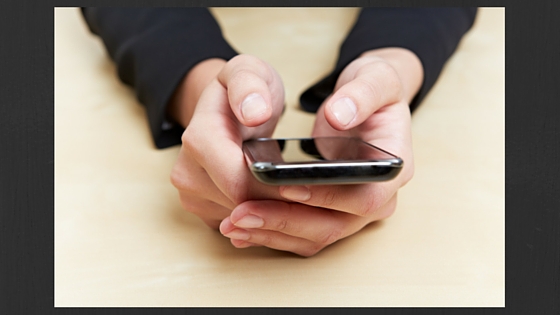Brooklyn Public Library’s Ready, Set, Kindergarten! Texting Initiative

Disclaimer: Jodi Shaw is a children’s librarian at Brooklyn Public Library.
Imagine shopping for groceries with your toddler. Suddenly, your phone lights up with a text: “Play with math. Go on a shape hunt…use geometric terms to describe what you find.” You turn down the aisle and begin hunting for circles on cereal boxes with your toddler.
This kind of interaction, in which a caregiver “plays” with their child in a way that promotes early childhood literacy, is exactly what Jessica Ralli, coordinator of early literacy programs, and Rachel Payne, coordinator of early childhood services, at Brooklyn Public Library (BPL), seek to promote through “Ready, Set, Kindergarten (RSK) on the Go!” a texting campaign that complements BPL’s face-to-face early literacy program, “Ready, Set, Kindergarten!”
Why Texts?
The idea was born out of a New York Times article[1] that cites a study[2] that found preschoolers whose parents received early literacy tips via texts did better on literacy tests than children whose parents didn’t receive early literacy tips via text[3]. Since 88 percent of American adults own a cell phone[4], texting is an effective outreach method. Also, since unlike other technologies there is virtually no digital divide based on ethnicity, income, or education level[5], texting is an effective means of confronting the thirty million “word gap” that exists between children from the wealthiest and poorest families[6]. It’s also easy; breaking down complex tasks into bite-size pieces[7] allows caregivers to incorporate tips while cleaning, driving, grocery shopping, and so on.
The Pilot
To get a sense for how it felt to be on the receiving end of a literacy texting campaign, Ralli and Payne signed up for other NYC campaigns such as Pre-K on the Go, Talk to Your Baby, and City’s First Readers. To determine how many texts to send, they conducted an informal survey of RSK participants and found a majority preferred to receive one text per week (as opposed to two or three). They solicited participants the old-fashioned way—approaching them in person and asking them to sign up. The program now has hundreds of participants.
The Content and the Cost
Ralli created sixty-five texts set to go out at different times according to the RSK curriculum, each based on one of five areas of the RSK program (Reading, Writing, Singing/Rhyming, Playing, and STEM/Science/Math) and rotating through a five-week cycle. As for the cost, Ralli and Payne got lucky; they were able to pilot their program using BPL’s existing SMS vendor (also used to notify patrons about overdue materials and holds). Thus, the pilot was cost-free.
The Technology
Because the use of texting for social outreach has increased, the number of SMS vendors is growing, and although the rapidly expanding membership of the RSK on the Go! program makes using a new SMS vendor inevitable, Ralli and Payne are content to take a wait-and-see approach. “We want to see what develops technology-wise,” says Ralli.[8]
Ralli would like a vendor that allows potential users to join with keyword, as well as one that enables two-way communication. “A more sophisticated platform would enable us to get feedback from participants,”[9] she says; for example, asking parents what tips they tried, how well they worked, and the ability to tailor texts to the child’s language or developmental stage.
Some SMS vendors allow for real-time editing, a desirable feature because texts can be modified to complement specific library activities or events.
Texting and Libraries: The Trend
BPL is not the only library with an early childhood texting campaign. Dayton Metro Library (Ohio), Frisco Public Library (Texas), Darien Library (Conn.), Oak Park Public Library (Ill.) all have texting programs.
Conclusion
Already used for refugee assistance, rape support, natural disaster relief, AMBER Alerts, school and workplace closings/emergencies, SMS technology is proving an effective means of social outreach. That libraries would be quick to adopt this technology makes perfect sense.
References
[1] Motoko Rich, “To Help Language Skills of Children, a Study Finds, Text Their Parents With Tips,” New York Times, November 14, 2014.
[2] Benjamin York and Susanna Loeb, “One Step at a Time: The Effects of an Early Literacy Text Messaging Program for Parents of Preschoolers,” The National Bureau of Economic Research, November 2014.
[3] Jessica Ralli and Rachel Payne, “Brooklyn Public Library’s Texting Initiative for Early Literacy,” School Library Journal, July 13, 2015.
[4] Kathryn Zickuhr and Aaron Smith, “Digital Differences,” Pew Research Center, April 23, 2012.
[5] John Hoffman, “OMG! You’re Not Using Text Messaging to Reach Constituents?” Nonprofit Quarterly, August 22, 2012.
[6] Laura J. Colker, “The Word Gap: the Early Years Make the Difference,” Teaching Young Children 7, no. 3 (no date)
[7] Ann Schimke, “A New Medium for Early Literacy Tips: Texting,” Chalkbeat, January 8, 2015.
[8] Jessica Ralli, coordinator of early literacy programs at Brooklyn Public Library, in an interview with the author, April 25, 2016.
[9] Ibid.
Tags: Brooklyn Public Library, early childhood literacy, early literacy activities












